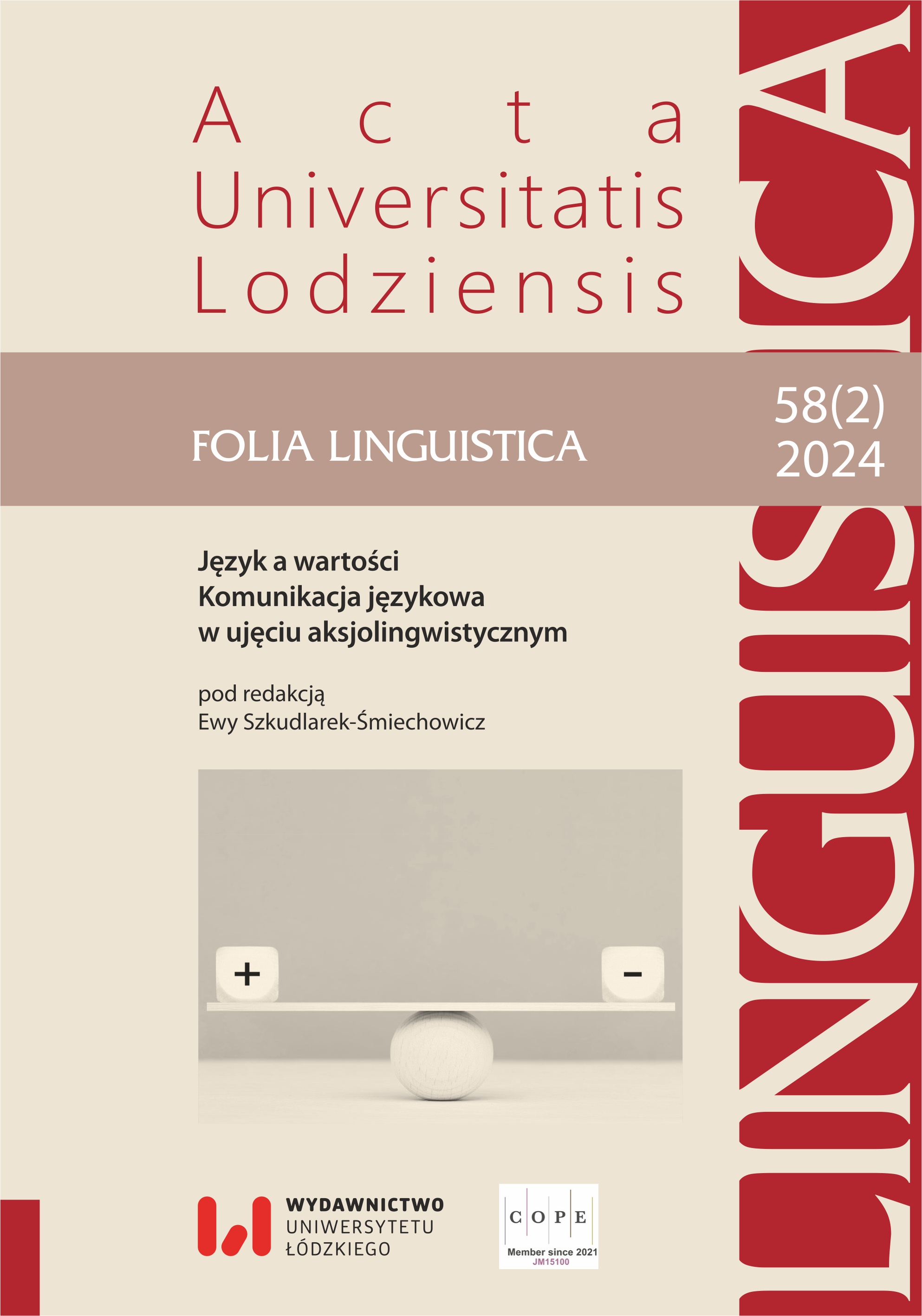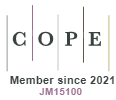Emotions in Polish and German sports live commentary. A comparative analysis of linguistic means used to express and refer to emotions
DOI:
https://doi.org/10.18778/0208-6077.58.2.14Keywords:
emotions, sports commentary, metaphorAbstract
The paper examines linguistic means used to designate and express emotions in Polish and German sports live commentary. The analysis has been based on contextual citations derived from selected real-time live commentary of the Alpine Ski World Cup and the Biathlon World Cup of the season 2023/2024. The analysis has shown that a significant number of examples illustrating similar conceptualizations of emotions in Polish and German stands for their universal character. The main differences between sports commentaries in question may result from the popularity of a sports discipline, emotional involvement of the sports commentator, or standardization of the sports commentary.
Downloads
References
Bentle G., Brosius H.B., Jarren O. (red.), 2013, Lexikon Kommunikations- und Medienwissenschaft, Wiesbaden: Springer Verlag. https://doi.org/10.1007/978-3-531-93431-0
Google Scholar
DOI: https://doi.org/10.1007/978-3-531-93431-0
Biathlon Mixed Staffel — das Re-Live, Das Erste, http://www.sportschau.de/wintersport/biathlon/re-live-biathlon-wm-mixed-staffel-100.html (dostęp: 20.03.2024).
Google Scholar
Biathlon-WM Nove Mesto. Einzel Frauen, Highlights, ZDF, http://www.zdf.de/sport/wintersport#videoId=biathlon-wm-nove-mesto-einzel-frauen-zusammenfassung-highlights-100 (dostęp: 20.03.2024).
Google Scholar
Crans-Montana, Supergigant kobiet, Eurosport, URL: http://www.player.pl/eurosport,24/crans-montana-supergigant-kobiet,8930998 (dostęp: 20.03.2024).
Google Scholar
Das Einzelrennen der Frauen — die komplette Übertragung, Das Erste, http://www.sportschau.de/wintersport/biathlon/wm-frauen-nove-mesto-komplett-100.html (dostęp: 21.03.2024).
Google Scholar
Der Biathlon-Sprint der Frauen bei der WM im Re-Live, Das Erste, https://www.ardmediathek.de/video/sportschau-wintersport/der-biathlon-sprint-der-frauen-bei-der-wm-im-re-live/das-erste/Y3JpZDovL3Nwb3J0c2NoYXUuZGUvODk4MmUyZGYtZWVmOC00YzkwLWIxYTEtYzQ5ZDg3YmRhZDhm (dostęp: 21.03.2024).
Google Scholar
Dudenredaktion (o.J): „Emotion” auf Duden Online, http://www.duden.de/rechtschreibung/Emotion (dostęp: 10.06.2024).
Google Scholar
Dudenredaktion (o.J.): „Gefühl” auf Duden Online, http://www.duden.de/rechtschreibung/Gefuehl (dostęp: 10.06.2024).
Google Scholar
DWDS — Digitales Wörterbuch der deutschen Sprache. Das Wortauskunftsystem zur deutschen Sprache in Geschichte und Gegenwart, hrsg. v.d. Berlin-Brandenburgischen Akademie der Wissenschaften, http://www.dwds.de (dostęp: 27.03.2024).
Google Scholar
Fiehler R., 2010, Sprachliche Formen der Bennenung und Beschreibung von Erleben und Emotionen im Gespräch, „Studia Germanistica”, t. 6, „Acta Facultatis Philosophicae Universitatis Ostraviensis Studia Germanistica”, s. 19–30.
Google Scholar
Grochala B., 2012a, Dwugłos dziennikarsko-ekspercki — wpływ czynników pragmatycznych na sposób konstruowania komentarza sportowego/relacji sportowej na żywo, „Język a Kultura”, t. 23: Akty i gatunki mowy w perspektywie kulturowej, s. 199–209.
Google Scholar
Grochala B., 2012b, Komentarz (sportowy), relacja (sportowa), sprawozdanie (sportowe) — przegląd stanowisk, „Acta Universitatis Lodziensis. Folia Litteraria Polonica”, t. 17, s. 95–105. https://doi.org/10.18778/1505-9057.17.09
Google Scholar
DOI: https://doi.org/10.18778/1505-9057.17.09
Grochala B., 2019, Język sportu a wyrażanie emocji — nowa (?) perspektywa oglądu, „Prace Językoznawcze”, t. 21(9), s. 19–29. https://doi.org/10.31648/pj.4686
Google Scholar
DOI: https://doi.org/10.31648/pj.4686
Ekman P., 1999, Basic Emotions, w: T. Dalgleish, T. Power (red.), The Handbook of Cognition and Emotion, Sussex: John Wiley & Sons, Ltd, s. 45–60. https://doi.org/10.1002/0470013494.ch3
Google Scholar
DOI: https://doi.org/10.1002/0470013494.ch3
Harkins J., Wierzbicka A. (red.), 2001, Emotions in Crosslinguistic Perspective, Berlin–New York: Mouton de Gruyter. https://doi.org/10.1515/9783110880168
Google Scholar
DOI: https://doi.org/10.1515/9783110880168
Kvitfjell, 2. Supergigant kobiet, Eurosport, http://www.player.pl/eurosport,24/kvitfjell-2-supergigant-kobiet,8981315 (dostęp: 20.03.2024).
Google Scholar
Lewandowska-Tomaszczyk B., Wilson P. A., 2013, English „fear” and Polish „strach” in contrast: The GRID paradigm and the Cognitive Corpus Linguistic methodology, w: J.J.R. Fontaine, K.R. Sherer, C. Soriano (red.), Components of Emotional Meaning: A sourcebook, New York: Oxford University Press, s. 425–436.
Google Scholar
DOI: https://doi.org/10.1093/acprof:oso/9780199592746.003.0030
Łątka E., 2012, Czy mówienie o emocjach w języku obcym jest możliwe? O potrzebie rekonstruowania skryptów kulturowych wyrażania emocji dla glottodydaktyki polszczyzny, „Acta Universitatis Lodziensis. Kształcenie Polonistyczne Cudzoziemców”, t. 19, s. 35–43.
Google Scholar
Mückel W., 2019, Metaphorik im Kommunikationsbereich der Sprachfachlichkeit, „Fachsprache 41 (S1)”, s. 87–100. https://doi.org/10.24989/fs.v41iS1.1768
Google Scholar
DOI: https://doi.org/10.24989/fs.v41iS1.1768
Ostrowski A., 2021, Telewizyjne imperium sportowe. Prawdy i fikcje, Wrocław: Oficyna Wydawnicza ATUT.
Google Scholar
Plutchik R., 1980, Emotion: A Psychoevolutionary Synthesis, New York: Harper and Row.
Google Scholar
Rejter A., 2010, Język a emocje w ujęciu glottodydaktycznym, w: A. Achtelik, M. Kita, J. Tambor (red.), Sztuka i rzemiosło. Nauczyć Polski i polskiego, t. 2, Katowice: Gnome, s. 75–83.
Google Scholar
Saalbach. Slalom Kobiet, Eurosport, http://www.player.pl/eurosport,24/saalbach--slalom-kobiet-2-przejazd,8961658 (dostęp: 21.03.2024).
Google Scholar
Schwarz-Friesel M., 2008, Sprache, Kognition und Emotion: Neue Wege in der Kognitionswissenschaft, w: H. Kämper, L.M. Eichinger (red.) Sprache — Kognition — Kultur. Sprache zwischen mentaler Struktur und kultureller Prägung. Institut für Deutsche Sprache Jahrbuch 2007, Berlin–New York: Walter de Gruyter, s. 277–301. https://doi.org/10.1515/9783110970555-014
Google Scholar
DOI: https://doi.org/10.1515/9783110970555-014
Schwarz-Friesel M., 2013, Sprache und Emotion, Tübingen–Basel: A. Francke Verlag. https://doi.org/10.36198/9783838540399.
Google Scholar
DOI: https://doi.org/10.36198/9783838540399
Slalom kobiet, 2. przejazd, Eurosport, http://www.player.pl/eurosport,24/soldeu-slalom-kobiet-2-przejazd,8667687 (dostęp: 20.03.2024).
Google Scholar
Słownik języka niemieckiego PONS, http://www.pl.pons.com/t%C5%82umaczenie (dostęp: 26.06.2024).
Google Scholar
Statista Consumer Insights, 2014, Welche Sportarten faszinieren die Deutschen?, http://www.de.statista.com/infografik/30076/befragung-zum-interesse-an-verschiedenen-sportarten/ (dostęp: 18.09.2024).
Google Scholar
Szkudlarek-Śmiechowicz E., 2006, Wyrażanie emocji w telewizyjnych komentarzach sportowych, w: K. Michalewski (red.), Wyrażanie emocji, Łódź: Wydawnictwo Uniwersytetu Łódzkiego, s. 353–365.
Google Scholar
Szczepaniak J., 2015, Sprachspiel Emotion: zum medialen und semiotischen Status von Emotionen, Bydgoszcz: Wydawnictwo Uniwersytetu Kazimierza Wielkiego.
Google Scholar
Szczepaniak J., 2017, EMOCJE jako zmaterializowane UCZUCIA. Próba lingwistycznej eksplikacji MIŁOŚCI w tekstach pisanych, „Biuletyn Polskiego Towarzystwa Językoznawczego”, t. 73, s. 259–270.
Google Scholar
Szczepaniak J., 2021, Emotionen als diskursive Phänomene, „Stylistyka”, t. 30, s. 11–24. https://doi.org/10.25167/Stylistyka30.2021.1
Google Scholar
DOI: https://doi.org/10.25167/Stylistyka30.2021.1
Taborek J., 2012, Language of sports. Some remarks on the language of football, w: H. Lankiewicz, E. Wąsikiewicz-Firlej (red.), Informed teaching — premises of modern foreign language pedagogy, Piła: Wydawnictwo PWSZ, s. 239–255.
Google Scholar
Tworek A., 2000, Język sportu — próba definicji (analiza języka polskiego i niemieckiego), w: G. Szpila (red.), Język a komunikacja, t.: Język trzeciego tysiąclecia, Kraków: Tertium, s. 331–340.
Google Scholar
Wierzbicka, A., 1999, Emotions across Languages and Cultures: Diversity and Universals. Cambridge: Cambridge University Press. https://doi.org/10.1017/CBO9780511521256
Google Scholar
DOI: https://doi.org/10.1017/CBO9780511521256
Żmigrodzki P. (red.), Wielki słownik języka polskiego, https://wsjp.pl/ (dostęp: 27.03.2024).
Google Scholar
Downloads
Published
How to Cite
Issue
Section
License

This work is licensed under a Creative Commons Attribution-NonCommercial-NoDerivatives 4.0 International License.










